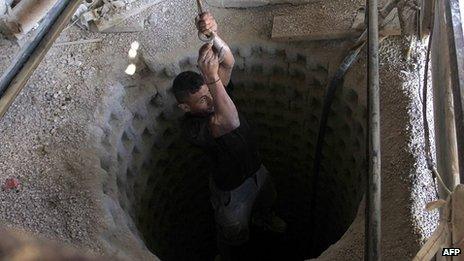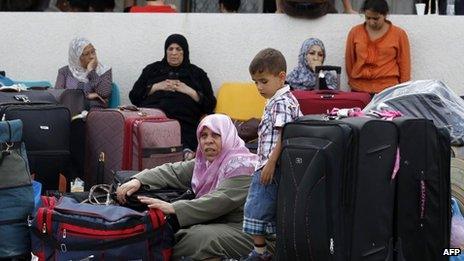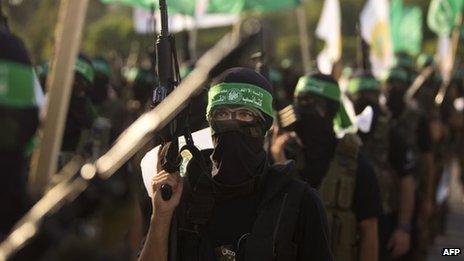Hamas under pressure as Gaza border tensions rise
- Published
Fighting in the Sinai region of Egypt is having a knock on effect on life in the Gaza Strip
The large white tents constructed in a row along the Gaza Strip's border with Egypt are ragged and abandoned; most of the thousands of smugglers who usually work in them are absent.
Four Palestinians are using a horse and a winch to bring up buckets of dirt as they try to dig a new passage deep under the border with Egypt.
Nearby, Abu Ahmed, and his workers are struggling to make repairs to their tunnel. Until recently they were part of a profitable trade, bringing in Egyptian construction materials.
Now their business has literally collapsed.
"Ninety-five per cent of the tunnels are not functioning. It's almost total destruction," Abu Ahmed tells me. "The Egyptians demolished my tunnel and filled it with water."
Recently Egypt's military has brought in bulldozers to clear a house and olive grove concealing tunnel entrances on its side of the border. Passages have been flooded or filled with sewage and blocked off.

Until recently thousands of Palestinians were employed in the tunnel trade
A network of hundreds of tunnels was constructed after the Islamist group Hamas overran Gaza in 2007, a year after winning parliamentary elections.
Israel - which considers Hamas a terrorist organisation - and Egypt tightened a blockade on the Palestinian territory.
Smuggling was a way of bypassing the restrictions. It was an important lifeline for the 1.7m Palestinians living in Gaza who relied on the imports of everyday goods and cheap Egyptian fuel.
However, the underground passages have also been used to transfer weapons, and by armed militants to cross the border unseen. The Egyptian authorities see them as a serious threat to security.
Sinai unrest
Attacks by Islamist militants in the Sinai region, which neighbours Gaza, have increased dramatically in the past three months, since the ousting of Egypt's Islamist President, Mohammed Morsi.

The new Cairo government accuses Hamas, which has ideological links to Mr Morsi's Muslim Brotherhood movement, of supporting the extremists. It denies doing so.
Yet local media reports suggest that the Egyptian army has even threatened a military intervention in the Gaza Strip if attacks on its troops in the Sinai Peninsula are not stopped.
As tensions have risen, numbers of Palestinians being allowed to cross through the Rafah border crossing have been restricted. Thousands have got stuck trying to leave Gaza.
Yousef Helou had to wait for two weeks to exit so he could take up his research scholarship at Oxford University. "You can see the misery on the faces of people here who are trying to leave. We are denied our own right to freedom of movement," he says.
"We are ordinary people, we live in Gaza, we are not responsible for the mistakes of Hamas or any other party, so why are we being punished collectively?"

It has become much more difficult to leave Gaza through the Rafah border crossing with Egypt
Last month, Israel further eased its import restrictions on Gaza, allowing construction materials to enter for the private sector.
It said this was in response to a request from the Palestinian President Mahmoud Abbas, a political rival of Hamas, whose Palestinian Authority governs parts of the West Bank.
Mr Abbas recently returned to peace talks with Israel that the Gaza government rejects.
His achievements only add to the sense that Hamas has found itself on the wrong side of recent events in the Middle East.
Lost allies
Nathan Thrall, a senior analyst from International Crisis Group, says the Islamist organisation originally had high hopes of the Arab uprisings.
"Hamas saw that the entire region was moving in their favour. They saw Islamist movements and Muslim Brotherhood-affiliated movements rising and they saw that their position was going to be dramatically reversed," he says.
"They had been isolated not just by the West but by the Arab world and they felt that this was the dawn of a new era in which they would be legitimised and in which they potentially take over the entire Palestinian national movement. Now it looks quite the opposite."

Recent parades by al-Qassam Brigades, the military wing of Hamas, are intended as a show of force
The deputy foreign minister in Gaza, Ghazi Hamed admits that Hamas is currently "suffering" but says it has overcome many challenges since its election win seven years ago.
"All the time we are passing different hard stages. We started with the political isolation, with economic boycotts, incursions, wars against Gaza, but we succeeded to pass this," he says.
"The situation now in Egypt is not easy for us. We feel now there are some people who tried to squeeze us in the corner. But I think sooner or later we will get out of this crisis."
It is clear that funding is a major issue for Hamas which has to pay the salaries of 40,000 government workers. Previously it raised large sums from tunnel taxes.
One strategy appears to be to try to mend ties with Iran, which was the main financial and military benefactor of the group. Relations were damaged and funding was cut back when Hamas backed Sunni Muslim rebels fighting the government of President Bashar al-Assad in Syria, a strategic ally of Tehran.
In the meantime, the military wing of Hamas, its al-Qassam Brigades, has given its own response to the current pressures.
There have been recent parades by masked militants carrying rocket-propelled grenades and guns that are clearly intended as a show of force; a dramatic reminder that for now Hamas retains a firm grip on Gaza.